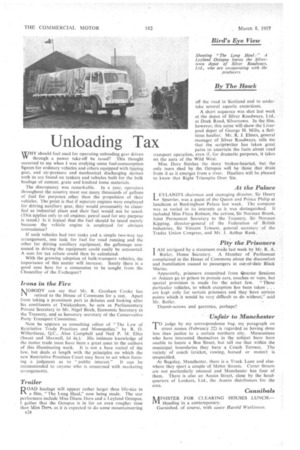Unloading Tax
Page 58

If you've noticed an error in this article please click here to report it so we can fix it.
WHY should fuel used for operating unloading gear driven through a power take-off be taxed? This thought occurred to me when I was studying some fuel-consumption figures for ordinary vehicles and others equipped with tipping gear, and air-pressure and mechanical discharging devices such as are found on tankers and vehicles built for the bulk haulage of cement, grain and kindred loose materials. The discrepancy was remarkable. In a year, operators throughout the country must use many thousands of gallons of -fuel for purposes other than the propulsion of their vehicles. The point is that if separate engines were employed for driving auxiliary gear, they would presumably be classified as industrial plant and their fuel would not be taxed. (This applies only to oil engines: petrol used for any purpose is taxed.) Is it logical that the fuel should be taxed merely because the vehicle engine is employed for obvious convenience?
If such vehicles had two tanks and a simple two-way tap arrangement, one tank for fuel for road running and the other for driving auxiliary equipment, the gallonage consumed in driving the equipment could easily be accounted. A sum for tax rebate could then be calculated. With the growing adoption of bulk-transport vehicles, the importance of this matter will increase. Surely there is a good case here for a concession to be sought. from the Chancellor of the Exchequer?
Irons in the Fire
NOBODY can say that Mr. R. Gresham Cooke has
retired to the House of Commons for a rest. Apart from taking a prominent part in debates and looking after his contituents at Twickenham, he acts as Parliamentary Private Secretary to Mr. Nigel Birch, Economic Secretary to the Treasury, and as honorary secretary of the Conservative Party Transport Committee.
Now he appears as consulting editor of "The Law of Restrictive Trade Practices and Monopolies," by R. 0. Wilberforce, QC., Alan Campbell and Neil P. M. Elles (Sweet and Maxwell, izt .4s.):His intimate knowledge of the motor, trade must have been a great asset to the authors of this illuminating work. It is not a bare recital of the law, but deals at length with the principles on which the new Restrictive Practices Court may have to act when forming a judgment as to ." public interest." It can be recommended to anyone who is concerned with marketing arrangements.
Trailer
ROAD haulage will appear rather larger than life-size in a film, " The Long Haul," now being Made. The star performers include Miss Diana Dors and a Leyland Octopus. I gather that the Octopus is in for an even rougher time than Miss Dom as it is expected to do some mountaineering
n24 A short sequence was shot last week at the depot of Silver Roadways, Ltd., at Dock Road, Silvertown. In the film, however, this scene will show the Liverpool depot of George H. Mills, a fictitious haulier. Mr. R. J. Elmes, general manager of Silver Roadways, tells me that the scriptwriter has taken great pains to ascertain the facts about road transport operation, even if, for dramatic purposes, it takes on the aura of .the Wild West. Miss Dors finishes the story broken-hearted, but the only tears shed by the Octopus will be those that drain from it as it emerges from a river. Hauliers will be pleased to know that Right Triumphs Over Sin.
At the Palace
LEYLAND'S chairman and managing director, Sir Henry Spurrier, was a guest of the Queen and Prince Philip-at luncheon at Buckingham Palace last week. The company was as varied in its interests as it was distinguished. It included Miss Flora Robson, the actress, Sir Norman Brook, Joint Permanent Secretary to the Treasury, Sir Norman Kipping, director-general of the Federation of British Industries, Sir Vincent TeWson, general secretary of the Trades Union Congress, and Mr. J. Arthur Rank.
Pity the Prisoners
I AM intrigued by a statement made 'last week by Mr. R. A.
Butter, Home Secretary. A Member of Parliament complained in the House of Commons about the discomfort and humiliation caused to passengers in out-of-date Black rvlarias.
Apparently, prisoners committed from Quarter Sessions or Assizes go to prison in prosaic cars, coaches or vans., but special provision is made for the select few. "These particular vehicles, to which exception has been taken . • . are kept only for certain prisoners and they have certain points which it would be very difficult to do without," said Mr. Butler.
Thumb-screws and garrottes, perhaps?
'Unfair to Manchester
T°judge by my correspondence bag, my paragraph on street names (February 22) is regarded as having done less than justice to a certain northern city. Mancunians who have interested themselves in the subject have been unable to locate a Bus Street, but tell me that within the municipal. boundaries they have a Coach Terrace. The variety of coach (cricket, rowing, horsed or motor) is unspecified. At BaguIey, Manchester, there is a Truck Lane and elsewhere they sport a couple of Motor Streets. Carter Streets are not particularly unusual and Manchester has four of them. There is also an Austin Street, close by the headquarters of Lookers, Ltd., the Austin distributors for the area.
Cannibals
NAINISTER FOR CLEARING HOUSES LUNCH.— "' Heading in a contemporary.
Garnished, of course, with SWICC Harold Wotkinson.




































































































